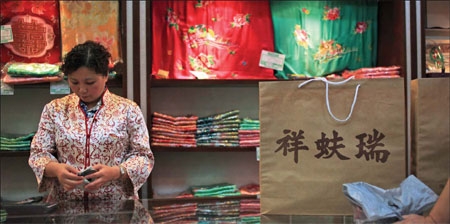Old name, fresh face
Updated: 2012-04-20 08:46
By Xiao Xiangyi (China Daily European Edition)
|
|||||||||||
|
 Ruifuxiang, a time-honored Chinese silk shop, also sells ready-to-wear clothes that gives more choices for customers. Provided to China Daily
|
Time-honored brands are expanding their range of products to keep up with the growing economy
Laozihao, which means time-honored brand in China, is an honor granted by the nation's Ministry of Commerce to mainland enterprises whose brands have stood the test of time and are widely recognized. In other words, these are old companies. Most critics say they are dying off, swallowed up in the rapid development of the nation's economy and in the competition against multinational firms. But a handful of brands in China, which have recognized that their days are numbered if they don't innovate and refashion their image, have in the past few years clawed back to life.
|
||||
Take Wuyutai, for example. The tea company, established in 1887, won over a much younger customer base by introducing maccha green tea ice cream three years ago.
On a recent afternoon, a long queue of youths was waiting to buy cones of the soft-serve ice creams in Beijing's Wangfujing Street, a very busy and hectic shopping neighborhood.
"The idea is when (youngsters) enter the shop, they see the ice creams and try it," says Sun Danwei, general manager at Wuyutai. "Many love it now."
The manager says the ice cream can generate more than 20,000 yuan ($3,174, 2,421 euros) in one Wuyutai store site on a typical Saturday.
Soon after the success of the ice cream, Wuyutai introduced tea-flavored chewing gums and tea moon cakes through the help of institutes including Zhejiang University and the Chinese Academy of Agricultural Sciences. The company is also designing tea goods for women as beauty and health products.
"Most of the China time-honored brands are endangered. But it is good to see some of them, or more exactly very few of them, are at least seeking a breakthrough by reevaluating and meeting the demands of the ever-changing market," says Kang Yan, vice-president of the Greater China division at Roland Berger Strategy Consultants, a major consultancy in Europe.
The story about the decay of time-honored brands in China is nearly as old as the brands themselves. After the nation's opening up and reform policies lowered hurdles for foreign imports in the late 1970s, some indigenous brands merged with transnational companies by setting up joint ventures. For the most part, however, local enterprises were on their own to maintain their brands.
Slowly, companies new to China began dominating these time-honored brands. But through new products, fresh marketing strategies and improved management, several of China's legendary brands have withstood the challenges.
"Time-honored brands are not necessarily old-fashioned. People usually see the old brand Coca-Cola as modern because it builds such a dynamic and trendy image," Kang says.
The transformation of these time-honored brands mostly began through an expansion in the range of products. New products have become a growth point for aging enterprises.
Today's Top News
Rescuers race against time for quake victims
Telecom workers restore links
Coal mine blast kills 18 in Jilin
Intl scholarship puts China on the map
More bird flu patients discharged
Gold loses sheen, but still a safe bet
US 'turns blind eye to human rights'
Telecom workers restore links
Hot Topics
Lunar probe , China growth forecasts, Emission rules get tougher, China seen through 'colored lens', International board,
Editor's Picks

|

|

|

|

|

|







